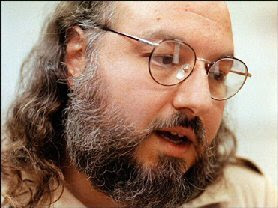 I’ve been meaning to take note of an excerpt in this New York Times story written when Dubya visited Israeli Prime Minister Ehud Olmert, but this is the first chance I’ve had, so…
I’ve been meaning to take note of an excerpt in this New York Times story written when Dubya visited Israeli Prime Minister Ehud Olmert, but this is the first chance I’ve had, so…Mr. Bush’s tour of Yad Vashem, the Israeli Holocaust Museum, and his trip to Galilee on Friday produced the not-so-revelatory headline, “Remembrance and Faith in the Holy Land.”It turns out that there has been a movement afoot for some time to free Pollard and allow him to emigrate to Israel (news to me anyway), and the Israelis have even granted him citizenship in an effort to expedite matters.
That item opened with a tantalizing clause — “After a later-than-usual dinner at Prime Minister Olmert’s residence ...” — but Mr. Gillespie dished no more, even though the dinner was, the Israeli accounts said, a raucous affair. It was said that Mr. Bush buttonholed two wavering members of Mr. Olmert’s cabinet, while an Israeli lawmaker buttonholed Mr. Bush about the case of the American spy Jonathan Pollard, to Mr. Olmert’s chagrin.
And this notes a time under President Clinton when he appeared to waver on the matter of freeing Pollard; this is a freeper site, I know, but the article was written by Sy Hersh, who has impeccable credentials on this stuff as far as I’m concerned. He states the following…
The President's willingness to consider clemency for Pollard so upset the intelligence community that its leaders took an unusual step: they began to go public. In early December, four retired admirals who had served as director of Naval Intelligence circulated an article, eventually published in the Washington Post, in which they argued that Pollard's release would be "irresponsible" and a victory for what they depicted as a "clever public relations campaign." Since then, sensitive details about the secrets Pollard gave away have been made public by CBS and NBC.Also part of the Pollard story is a 46-page classified document from former Reagan Secretary of Defense Caspar Weinberger, the contents of which were not shown to Pollard's attorneys at his trial. Weinberger called for severe punishment, and the memo, still classified, is widely cited as a major reason that the judge ultimately sentenced Pollard to life in prison without parole for espionage (Weinberger said he thought Pollard's treatment was too harsh before he died, though).
In the course of my own interviews for this account, the officials who knew the most about Jonathan Pollard made it clear that they were talking because they no longer had confidence that President Clinton would do what they believed was the right thing -- keep Pollard locked up. Pollard, these officials told me, had done far more damage to American national security than was ever made known to the public; for example, he betrayed elements of four major American intelligence systems. In their eyes, there is no distinction between betraying secrets to an enemy, such as the Soviet Union, and betraying secrets to an ally.
Officials are loath to talk publicly about it, but spying on allies is a fact of life: the United States invests billions annually to monitor the communications of its friends. Many American embassies around the world contain a clandestine intercept facility that targets diplomatic communications. The goal is not only to know the military and diplomatic plans of our friends but also to learn what intelligence they may be receiving and with whom they share information. "If a friendly state has friends that we don't see as friends," one senior official explained, sensitive intelligence that it should not possess -- such as that supplied by Pollard -- "can spread to others." Many officials said they were convinced that information Pollard sold to the Israelis had ultimately wound up in the hands of the Soviet Union.
But for me, aside from setting a terrible precedent, I think leniency to Pollard is wrong. And just because our “friends” the Israelis are upset over Pollard’s treatment, it doesn’t make releasing him the right thing to do.
No comments:
Post a Comment